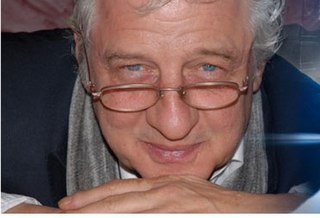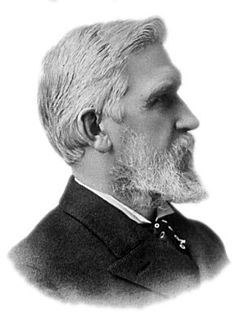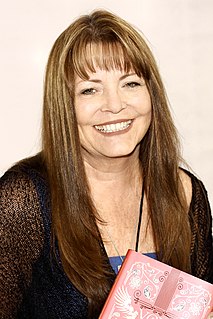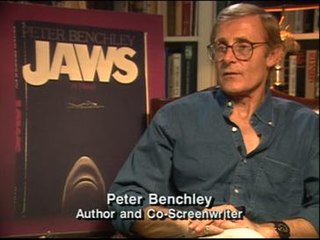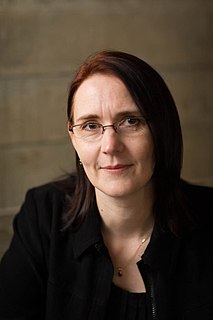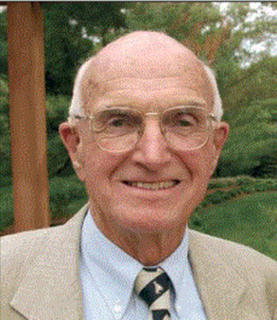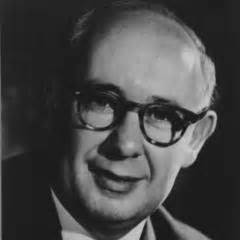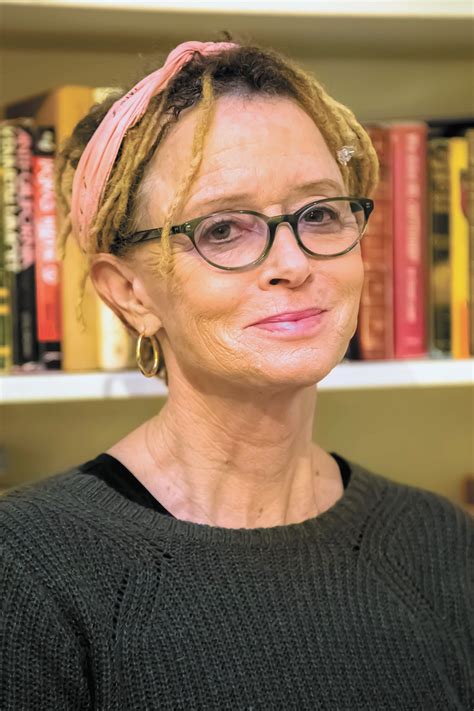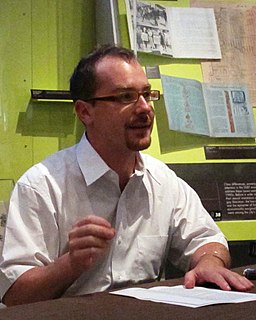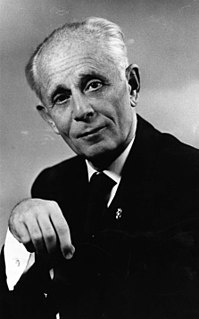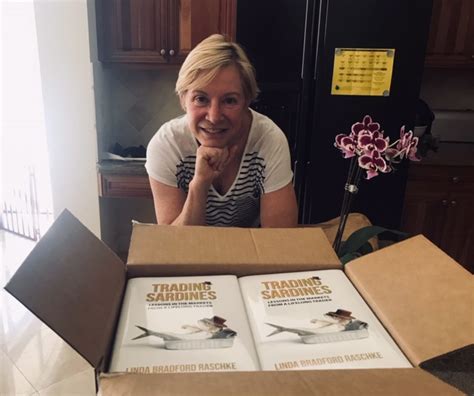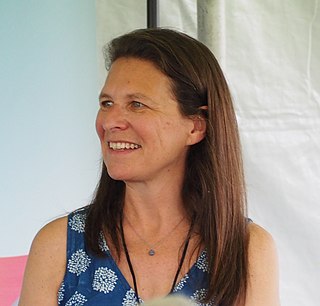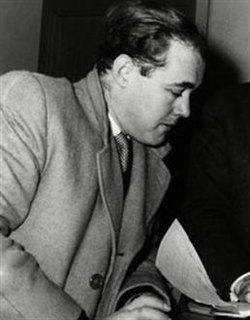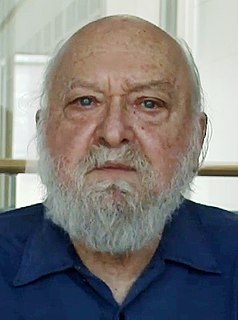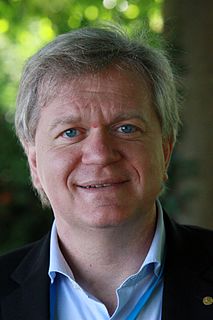Top 1200 Scientist Quotes & Sayings - Page 19
Explore popular Scientist quotes.
Last updated on December 25, 2024.
My father was a world-class scientist and my mother was a prolific painter. I could see that my parents had completely different ways of knowing and understanding the world, and relating to it. My father approached things through scientific inquiry and exploration, while my mother experienced things through her emotions and senses.
Charles Darwin [is my personal favorite Fellow of the Royal Society]. I suppose as a physical scientist I ought to have chosen Newton. He would have won hands down in an IQ test, but if you ask who was the most attractive personality then Darwin is the one you'd wish to meet. Newton was solitary and reclusive, even vain and vindictive in his later years when he was president of the society.
The natural scientist is concerned with a particular kind of phenomena ... he has to confine himself to that which is reproducible ... I do not claim that the reproducible by itself is more important than the unique. But I do claim that the unique exceeds the treatment by scientific method. Indeed it is the aim of this method to find and test natural laws.
We hackers are a playful bunch; we'll hack anything, including language, if it looks like fun (thus our tropism for puns). Deep down, we like confusing people who are stuffier and less mentally agile than we are, especially when they're bosses. There's a little bit of the mad scientist in all hackers, ready to discombobulate the world and flip authority the finger - especially if we can do it with snazzy special effects.
All great human deeds both consume and transform their doers. Consider an athlete, a scientist, an artist, or an entrepreneur. In service of their goals, they lay down time, energy and many other choices and pleasures; in return, they become most truly themselves. A false destiny may be spotted by the fact that it consumes without transforming, without giving back the enlarged self.
There's a lot of scientific data that I found out as a scientist that actually show that this is really a young Earth. I believe that the Earth is about 9,000 years old. I believe that it was created in six days as we know them. That's what the Bible says. And what I've come to learn is that it's the manufacturer's handbook, is what I call it. It ... teaches us how to run all our public policy.
To say that you can 'have experience,' means, for one thing, that your past plays into and affects your present, and that it defines your capacity for future experience. As a social scientist, you have to control this rather elaborate interplay, to capture what you experience and sort it out; only in this way can you hope to use it to guide and test your reflection, and in the process shape yourself as an intellectual craftsman
Must whales and dolphins be subjected to deafening noise that will cause more than 3.5 million instances of temporary and/or permanent hearing loss? For species that depend on hearing for survival - to find food, migrate, and communicate - any hearing loss could be catastrophic. As one scientist noted, a deaf whale is a dead whale.
Those to whom his word was revealed were always alone in some remote place, like Moses. There wasn't anyone else around when Mohammed got the word either. Mormon Joseph Smith and Christian Scientist, Mary Baker Eddy, had exclusive audiences with God. We have to trust them as reporters--and you know how reporters are. They'll do anything for a story.
If you deny yourself access to the child within because you're too serious, you also block your connection to the divine Light and your feminine self. Every creator who's any good uses their feminine side to create with.. Whether a scientist working on a hunch, a painter working on the interplay of colors, or a musician dealing with the juxtaposition of notes and chords.
Creative experimentation propels our culture forward. That our stories of innovation tend to glorify the breakthroughs and edit out all the experimental mistakes doesn't mean that mistakes play a trivial role. As any artist or scientist knows, without some protected, even sacred space for mistakes, innovation would cease.
When the uncultured man sees a stone in the road it tells him no story other than the fact that he sees a stone ... The scientist looking at the same stone perhaps will stop, and with a hammer break it open, when the newly exposed faces of the rock will have written upon them a history that is as real to him as the printed page.
If belief in evolution is a requirement to be a real scientist, it’s interesting to consider a quote from Dr. Marc Kirschner, founding chair of the Department of Systems Biology at Harvard Medical School:
“In fact, over the last 100 years, almost all of biology has proceeded independent of evolution, except evolutionary biology itself. Molecular biology, biochemistry, physiology, have not taken evolution into account at all.
My advice for people is to love the world they are in, in whatever way makes sense to them. It may be a devotional practice, it may be song or poetry, it may be by gardening, it may be as an activist, scientist, or community leader. The path to restoration extends from our heart to the heart of sentient beings, and that path will be different for every person.
How can you be sure?" "I'm a doctor, Jenna. And a scientist." "Does that make you an authority on everything? What about a soul, Father? When you were so busy implanting all your neural chips, did you think about that? Did you snip my soul from my old body, too? Where did you put it? Show me! Where? Where in all this groundbreaking technology did you insert my soul?
Everyone is free to set up an opinion and to adduce proofs in support of it. Whether, though, a scientist shall find it worth his while to enter into serious investigations of opinions so advanced is a question which his reason and instinct alone can decide. If these things, in the end, should turn out to be true, I shall not be ashamed of being the last to believe them.
Sharks have everything a scientist dreams of. They're beautiful?God, how beautiful they are! They're like an impossibly perfect piece of machinery. They're as graceful as any bird. They're as mysterious as any animal on earth. No one knows for sure how long they live or what impulses?except for hunger?they respond to. There are more than two hundred and fifty species of shark, and everyone is different from every other one.
I think my dad [ Stephen Hawking] would have been pleased if I had turned out a scientist because he truly believes that is the most interesting career open to anyone. But he also believes that you have to follow your own path in life and so he certainly wasn't going to push me toward theoretical physics when it didn't look like I was going in that direction naturally.
Friedrich Hayek, who died on March 23, 1992 at age 92, was arguably the greatest social scientist of the twentieth century. By the time of his death, his fundamental way of thought had supplanted the system of John Maynard Keynes - his chief intellectual rival of the century - in the battle since the 1930s for the minds of economists and the policies of governments.
I had two competing ambitions when I was a child: I wanted to be a Scientist and Discover Great Things, but I also wanted to be an Author and Write Great Things. I've always tried to combine the analytical with the creative, to some extent or another, because I find it hard to do one without the other. I've worked as a tech journalist, social media consultant, and now am self-publishing fiction.
Is the Church inimical to science? Growing up as a Catholic and a scientist - I don't see it. One truth is revealed truth, the other is scientific truth. If you really believe that creation is good, there can be no harm in studying science. The more we learn about creation - the way it emerged - it just adds to the glory of God. Personally, I've never seen a conflict.
And the most interesting natural structure? A giant, two-thousand-mile-long fish in orbit around Jupiter, according to a reliable report in the Weekly World News. The photograph was very convincing, and I'm only surprised that more-reputable journals like New Scientist, or even just The Sun, haven't followed up with more details. We should be told.
If two scientists are giving their papers at a symposium, and one of them is just naturally better at talking to the public or talking to a group of people, that scientist is liable to get more attention - in fact, I'm told that they do get more attention - than the one who's a little more stiff about it. Well, that's not good for science.
I note that warmists are often banging on about the fact that sceptics like Christopher Booker and myself 'only' have arts degrees. But actually that's our strength, not our weakness. Our intellectual training qualifies us better than any scientist - social or natural sciences - for us to understand that this is, au fond, not a scientific debate but a cultural and rhetorical one.
Though the world does not change with a change of paradigm, the scientist afterward works in a different world... I am convinced that we must learn to make sense of statements that at least resemble these. What occurs during a scientific revolution is not fully reducible to a re-interpretation of individual and stable data. In the first place, the data are not unequivocally stable.
I was always a mad scientist type - an inventor and just a generally inventive person, and that has remained the same. But one thing that *has* changed is that I've always been aggressively pro-business, with the mentality that whoever pays me, gets me - but now, I'd rather be broke than contribute to destroying the world my son is inheriting - both the social fabric, and obviously the environmental.
It has been a fortunate fact in the modern history of physical science that the scientist constructing a new theoretical system has nearly always found that the mathematics. . . required. . . had already been worked out by pure mathematicians for their own amusement. . . . The moral for statesmen would seem to be that, for proper scientific "planning", pure mathematics should be endowed fifty years ahead of scientists.
1. When a distinguished but elderly scientist states that something is possible, he is almost certainly right. When he states that something is impossible, he is very probably wrong. 2. The only way of discovering the limits of the possible is to venture a little way past them into the impossible. 3. Any sufficiently advanced technology is indistinguishable from magic.
You're going to die soon enough anyway; even if it's a hundred years from now, that's still the blink of a cosmic eye. In the meantime, live like a scientist - even a controversial one with only an ally or two in all the world - and treat life as a grand experiment, blood, sweat, tears and all. Bear in mind that there's no such thing as a failed experiment - only data.
If poets often commit suicide, it is not because their poems are bad but because they are good. Whoever heard of a bad poet committing suicide? The reader is only a little better off. The exhilaration of a good poem lasts twenty minutes, an hour at most. Unlike the scientist, the artist has reentry problems that are frequent and catastrophic.
It's absurd and quite tragic the way people have managed to pit science against faith. They aren't in conflict at all - they're long lost dance partners. I don't divide the world up into Christians and other people - we are all human beings, brothers and sisters, and we embrace truth wherever we find it, whether that's in a lab, a field or a cathedral. Because sometimes you need a scientist and sometimes you need a poet.
The fairest thing we can experience is the mysterious. It is the fundamental emotion which stands at the cradle of true science. He who knows it not, and can no longer wonder, no longer feel amazement, is as good as dead. We all had this priceless talent when we were young. But as time goes by, many of us lose it. The true scientist never loses the faculty of amazement. It is the essence of his being.
Religion is still parasitic in the interstices of our knowledge which have not yet been filled. Like bed-bugs in the cracks of walls and furniture, miracles lurk in the lacunae of science. The scientist plasters up these cracks in our knowledge; the more militant Rationalist swats the bugs in the open. Both have their proper sphere and they should realize that they are allies.
Back in 1792, Dr. Benjamin Banneker, the famed African-American inventor and scientist in Washington, proposed a Department of Peace for the new Nation to his friends George Washington and Thomas Jefferson. His prophetic suggestion was not implemented; but now, more than 200 years later, the need for a Peace Department is too compelling to ignore.
What can be more soul shaking than peering through a 100-inch telescope at a distant galaxy, holding a 100-million-year-old fossil or a 500,000-year-old stone tool in one's hand, standing before the immense chasm of space and time that is the Grand Canyon, or listening to a scientist who gazed upon the face of the universe's creation and did not blink?
Let's just say that if these scientist had been using their brilliance for good instead of evil, cars would run off water vapor and leave fresh compost behind them; no one would be hungry; no one would be ill; all buildings would be earthquake-, bomb-, and flood-proof; and the world's entire economy would have collapsed and been replaced by one based on the value of chocolate.
My practise as a scientist is atheistic. That is to say, when I set up an experiment I assume that no god, angel, or devil is going to interfere with its course; and this assumption has been justified by such success as I have achieved in my professional career. I should therefore be intellectually dishonest if I were not also atheistic in the affairs of the world. And I should be a coward if I did not state my theoretical views in public.
The truth is that once you get down on the trading floor, you find that the traders come from all walks of life. You don't have to be a rocket scientist to be a trader. In fact, some of the best traders whom I knew down on the floor were surf bums. Formal education didn't really seem to have much to do with a person's skill as a trader.
As a scientist, I cannot help feeling that all religions are on a tottering foundation . . . I am an infidel today. I do not believe what had been served to me to believe. I am a doubter, a questioner, a skeptic. When it can be proved to me that there is immortality, that there is resurrection beyond the gates of death, then will I believe. Until then, no.
It's 2013 ... The Time's obituary for Yvonne Brill, renowned rocket scientist, winner of the National Medal of Technology and Innovations, leads with, 'She made a mean beef stroganoff, followed her husband from job to job and took eight years off from work to raise three children. "The world's best mom," her son Matthew said.
My scientist friends have come up with things like 'principles of uncertainty' and dark holes. They're willing to live inside imagined hypotheses and theories. But many religious folks insist on answers that are always true. We love closure, resolution and clarity, while thinking that we are people of 'faith'! How strange that the very word 'faith' has come to mean its exact opposite.
If you say, "I'm bursting with joy," a scientist could analyze your skin and find it loaded with neuropeptides that may have antidepressant effects and that may modulate the immune system. If you say, "I feel exhilarated, unbounded, and joyful," and I were to examine your blood, I would find high levels of interleukin and interferon, which are powerful anticancer drugs.
Philosophy and science have not always been friendly toward the idea of God, the reason being they are dedicated to the task of accounting for things and are impatient with anything that refuses to give an account of itself. The philosopher and the scientist will admit that there is much that they do not know; but that is quite another thing from admitting there is something which they can never know, which indeed they have no technique for discovering.
There's a great difference between knowing that a thing is so, and knowing how to use that knowledge for the good of mankind. Thetrouble with a scientist is we quickly tire of our discoveries. We hand them over to people who are not ready for them, while we go off again into the darkness of ignorance, searching for other discoveries, which will be mishandled in just the same way when the time comes.
It's an experience like no other experience I can describe, the best thing that can happen to a scientist, realizing that something that has happened in his or her mind exactly corresponds to something that happens in nature. One is surprised that a construct of one's own mind can actually be realised in the honest-to-goodness world out there. A great shock, and a great, great joy.
Her mother was a Christian Scientist who didn't believe in calling doctors. So when my mother caught whooping cough as a baby, stopped breathing and turned blue, her mother revived her by spanking her on the bottom. She saw life itself as a gift and saw her own survival as precious and a matter of chance.
To the scientist, nature is always and merely a 'phenomenon,' not in the sense of being defective in reality, but in the sense of being a spectacle presented to his intelligent observation; whereas the events of history are never mere phenomena, never mere spectacles for contemplation, but things which the historian looks, not at, but through, to discern the thought within them.
I suppose that every age has its own particular fantasy: ours is science. A seventeenth-century man like Blaise Pascal, who thought himself a mathematician and scientist of genius, found it quite ridiculous that anyone should suppose that rational processes could lead to any ultimate conclusions about life, but easily accepted the authority of the Scriptures. With us, it is the other way `round
Certain signs, some of them visible to the layman as well as the scientist, indicate that we have been watching an ice age approach for some time without realizing what we are seeing... Scientists predict that it will cause great snows which the world has not seen since the last ice age thousands of years ago.
I think a scientist's job is to explore the Universe, to explore the cosmos around us. People always want to know - why is that useful? Well, on just pure fundamental grounds, on some level it's like art, it's like umm, music, it's aesthetics, it's like philosophy. You want to know where you are in the Universe.
Global warming is a false myth and every serious person and scientist says so. It is not fair to refer to the U.N. panel. IPCC is not a scientific institution: it’s a political body, a sort of non-government organization of green flavor. It’s neither a forum of neutral scientists nor a balanced group of scientists. These people are politicized scientists who arrive there with a one-sided opinion and a one-sided assignment.
I am of the theory that all of our transcendental connections, anything we're drawn to, be it a person, a song, a painting on a wall--they're magnetic. The art is the alloy, so to speak. And our souls are equipped with whatever properties are required to attract that alloy. I'm no scientist so I don't really know what the hell these properties are, but my point is we're drawn to stuff we've already got a connection to. Part of the thing is already inside of us.










